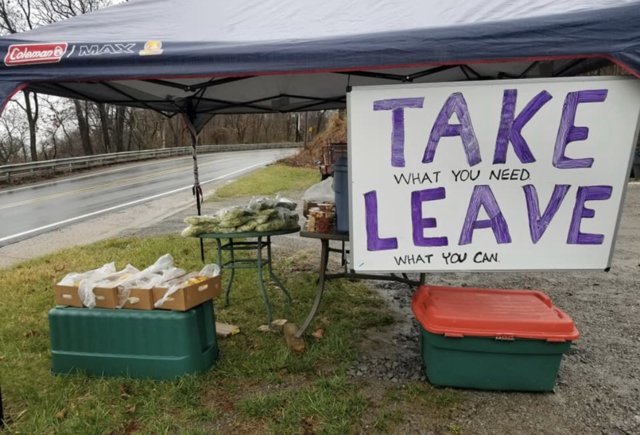コロナウイルスで物々交換経済が復活。
▼ページ最下部
The Return of the Barter Economy, Swapping Eggs for Toilet Paper
Since the beginning of March, unattended folding tables have begun popping up at intersections and the end of people’s driveways,
offering everyday goods like rice, a jar of jam or bread. Take what you need and leave what you can, the signs say.
Barter, the trade system prevalent in the Middle Ages, is back in the time of coronavirus pandemic, with a modern twist.
Social networks Facebook and Nextdoor are flooded with posts from neighbors and friends seeking to swap eggs for toilet paper. Small and midsized businesses,
whose cash trade has dried up from the economic fallout of shelter-in-place orders, are turning to online barter exchanges.
“When cash is extra tight, it behooves us to buy as much as possible on trade,” said David Yusen, director of business development for Seattle-based Heavy Restaurant Group,
which recently bought 56 cases of Malbec wine for $15,000 worth of barter credits. The company’s 10 restaurants have closed,
but some locations will start offering pick-up and delivery this week. “It saves us money, it helps cash flow.”
In normal times, the roughly 200 barter exchanges in the U.S. let roofers fix leaks and get paid in restaurant takeouts or accounting services. With tens of millions of Americans under lockdowns,
those cash-free trade systems are seeing an influx in participants.
3月の初め以来、無人の折りたたみ式テーブルが交差点や人々の私道の端に現れ始め、米、ジャムの瓶、パンなどの日用品を提供しています。必要なものを取り、できることはそのままにしておきましょう。
中世に普及した貿易システムであるバーターは、コロナウイルスのパンデミックの時代に戻り、現代風にアレンジされています。
ソーシャルネットワークFacebookとNextdoorには、卵をトイレットペーパーに交換しようとしている隣人や友人からの投稿が殺到しています。
シェルター・イン・プレース注文の経済的影響により現金取引が枯渇した中小企業は、オンライン物々交換に目を向けています。
シアトルを拠点とするHeavy Restaurant Groupの事業開発担当ディレクターであるDavid Yusenは最近、1万5,000ドル相当のバータークレジットでマルベックワインを56ケース購入しました。
同社の10軒のレストランは閉店しましたが、今週から一部の場所で集配が開始されます。 「それは私たちにお金を節約し、それはキャッシュフローを助けます。」
以下略
https://www.bloomberg.com/news/articles/2020-03-31/the-r...

Since the beginning of March, unattended folding tables have begun popping up at intersections and the end of people’s driveways,
offering everyday goods like rice, a jar of jam or bread. Take what you need and leave what you can, the signs say.
Barter, the trade system prevalent in the Middle Ages, is back in the time of coronavirus pandemic, with a modern twist.
Social networks Facebook and Nextdoor are flooded with posts from neighbors and friends seeking to swap eggs for toilet paper. Small and midsized businesses,
whose cash trade has dried up from the economic fallout of shelter-in-place orders, are turning to online barter exchanges.
“When cash is extra tight, it behooves us to buy as much as possible on trade,” said David Yusen, director of business development for Seattle-based Heavy Restaurant Group,
which recently bought 56 cases of Malbec wine for $15,000 worth of barter credits. The company’s 10 restaurants have closed,
but some locations will start offering pick-up and delivery this week. “It saves us money, it helps cash flow.”
In normal times, the roughly 200 barter exchanges in the U.S. let roofers fix leaks and get paid in restaurant takeouts or accounting services. With tens of millions of Americans under lockdowns,
those cash-free trade systems are seeing an influx in participants.
3月の初め以来、無人の折りたたみ式テーブルが交差点や人々の私道の端に現れ始め、米、ジャムの瓶、パンなどの日用品を提供しています。必要なものを取り、できることはそのままにしておきましょう。
中世に普及した貿易システムであるバーターは、コロナウイルスのパンデミックの時代に戻り、現代風にアレンジされています。
ソーシャルネットワークFacebookとNextdoorには、卵をトイレットペーパーに交換しようとしている隣人や友人からの投稿が殺到しています。
シェルター・イン・プレース注文の経済的影響により現金取引が枯渇した中小企業は、オンライン物々交換に目を向けています。
シアトルを拠点とするHeavy Restaurant Groupの事業開発担当ディレクターであるDavid Yusenは最近、1万5,000ドル相当のバータークレジットでマルベックワインを56ケース購入しました。
同社の10軒のレストランは閉店しましたが、今週から一部の場所で集配が開始されます。 「それは私たちにお金を節約し、それはキャッシュフローを助けます。」
以下略
https://www.bloomberg.com/news/articles/2020-03-31/the-r...

▲ページ最上部
ログサイズ:3 KB 有効レス数:1 削除レス数:0
不適切な書き込みやモラルに反する投稿を見つけた時は、書き込み右の マークをクリックしてサイト運営者までご連絡をお願いします。確認しだい削除いたします。
ニュース国際掲示板に戻る 全部 次100 最新50
スレッドタイトル:コロナウイルスで物々交換経済が復活。
